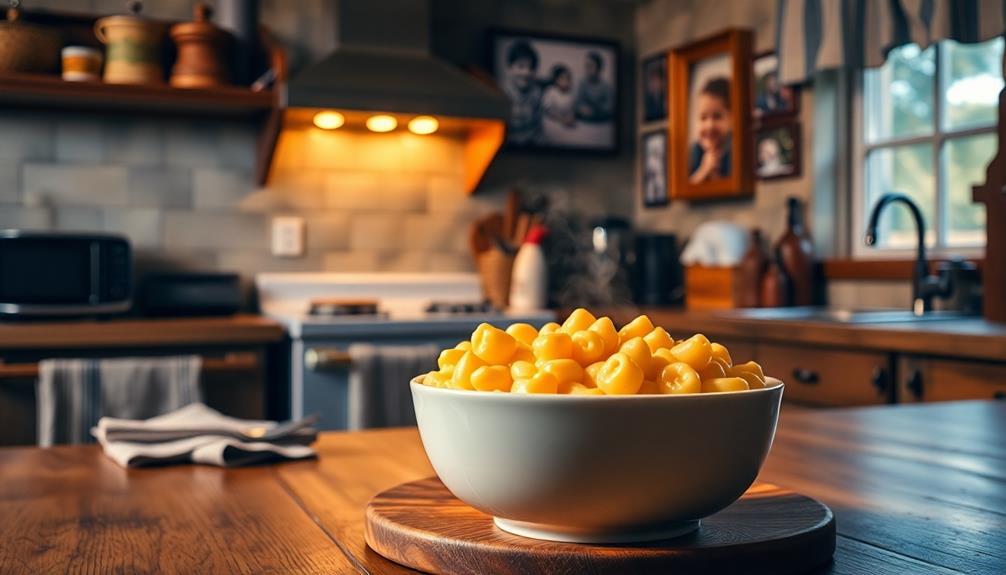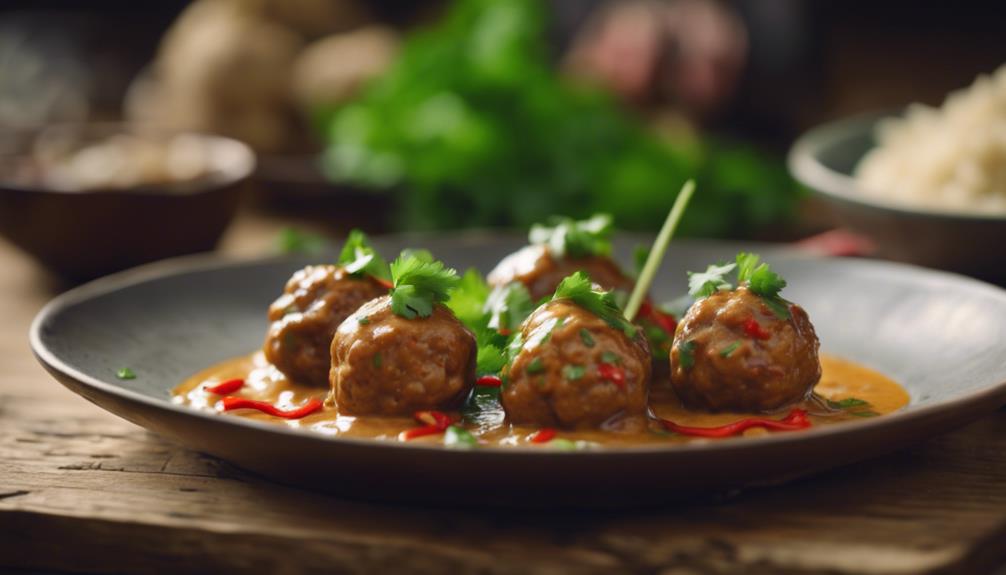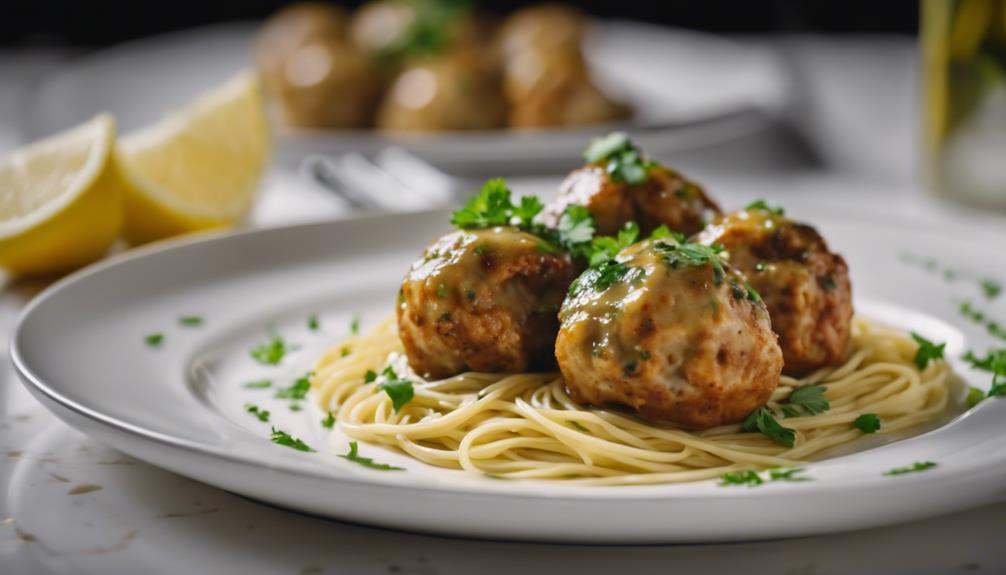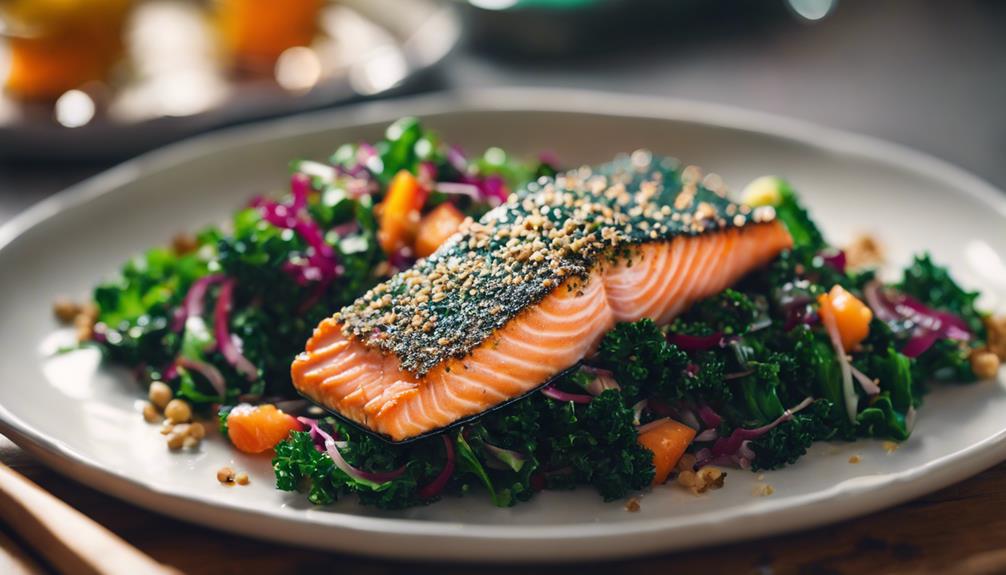Comfort food isn't just about taste; it stirs strong emotions and brings back warm memories. You might find joy in a bowl of mac and cheese or a slice of chocolate cake, because these foods activate pleasure centers in your brain. They're often rich, indulgent, and tied to personal experiences, providing comfort during tough times. However, relying too much on them can lead to unhealthy habits. Understanding the psychological and cultural significance behind these foods reveals why they feel so good. If you're curious about how these connections shape your emotional wellbeing, there's much more to explore.
Key Takeaways
- Comfort food evokes nostalgia and emotional connections, often tied to cherished memories and family traditions.
- Indulging in comfort food activates the brain's reward system, releasing mood-enhancing chemicals like endorphins and dopamine.
- High-fat and sugary comfort foods can improve mood temporarily, but excessive consumption may lead to guilt and unhealthy eating patterns.
- Cultural variations in comfort food reflect identity and heritage, creating strong communal bonds through shared meals.
- Recognizing emotional triggers for comfort food consumption can empower healthier coping strategies and foster emotional resilience.
Definition of Comfort Food
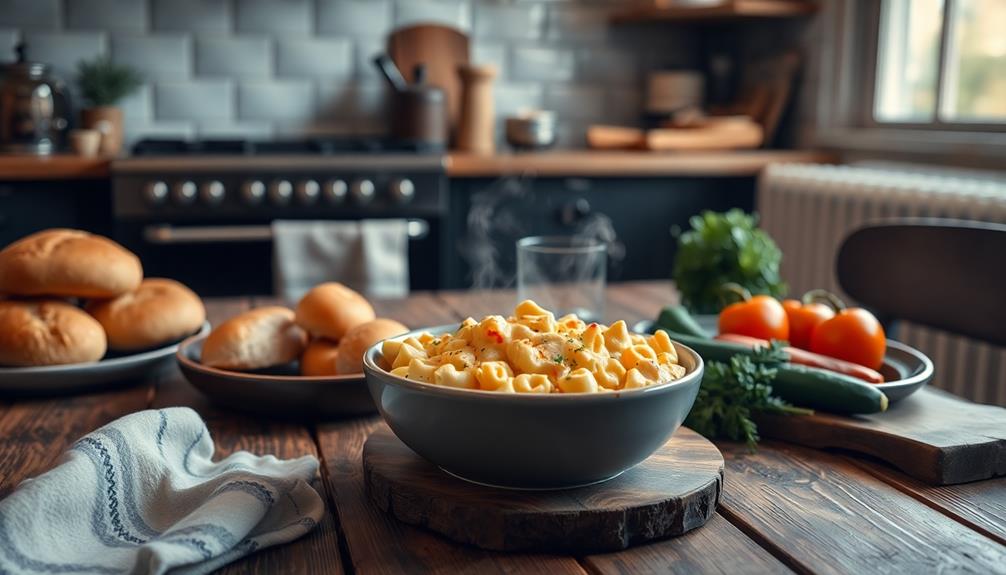
When you think of comfort food, you probably picture dishes that not only satisfy your hunger but also evoke warm memories and feelings of nostalgia. Comfort foods are often linked to family traditions and home-cooked meals, creating a sense of familiarity that can be incredibly soothing.
In Brazil, traditional dishes like Caldeirada and Brigadeiro provide a rich tapestry of flavors that can transport you back to cherished moments. Common examples like mac and cheese, chocolate, and fried foods are typically high in calories, fat, and sugar, making them instant sources of emotional fulfillment.
The act of indulging in comfort foods can trigger the release of dopamine, a neurotransmitter that boosts your mood and emotional well-being. This is why you might turn to these familiar flavors during stressful times; they temporarily alleviate anxiety and stress, providing a comforting escape.
However, it's important to recognize that while comfort foods can offer immediate relief, over-reliance on them can lead to unhealthy eating patterns and emotional eating.
Psychological Effects

Comfort food can significantly impact your psychological state, often leading to a complex interplay of emotions. When you indulge in high-fat, sugary, or salty comfort foods, your brain's reward system activates, releasing mood-enhancing chemicals like endorphins. This can provide a temporary boost in happiness, particularly during challenging times, as many people turned to childhood favorites during the pandemic for comfort.
In fact, 41% reported feeling increased happiness from these familiar dishes. Classic American comfort foods like Loaded Baked Potatoes demonstrate how nostalgia plays a significant role in our emotional responses to food.
However, the psychology behind comfort food isn't always straightforward. While you might feel a momentary sense of satisfaction, more than 56% of individuals have reported feeling worse afterward. This highlights a disconnect between short-term pleasure and long-term emotional well-being.
If you find yourself eating during negative moods, you might experience a cycle of guilt and regret, especially if you're aware of the nutritional downsides of your choices. Emotional eating can lead to a fleeting sense of comfort but also a lingering sense of disappointment.
In understanding these psychological effects, you can start to recognize patterns in your eating habits and their impact on your overall emotional health.
Brain Chemistry and Rewards

Eating comfort foods doesn't just provide a momentary escape; it also sparks significant changes in your brain chemistry. When you indulge in these foods, your brain releases endorphins and opioid-based chemicals, activating the reward pathways that create a sense of pleasure. This immediate gratification reinforces your desire to reach for these favorites time and time again.
For instance, dishes like Mushroom Masala or sweet treats such as Rasgulla can evoke feelings of nostalgia and warmth, enhancing the comfort experience.
Foods high in fat and sugar are particularly effective at stimulating the production of dopamine, the neurotransmitter that makes you feel happy and satisfied. Carbohydrate-rich comfort foods can also elevate serotonin levels, which correlate with improved mood and emotional well-being. If you're sensitive to sweetness, you might notice even stronger brain-reward responses when you enjoy sugary treats, enhancing your overall enjoyment.
However, it's important to be mindful. Relying too heavily on comfort foods can lead to lasting changes in your brain chemistry, potentially resulting in unhealthy eating patterns and increasing your risk of obesity and related health issues.
Cultural Variations
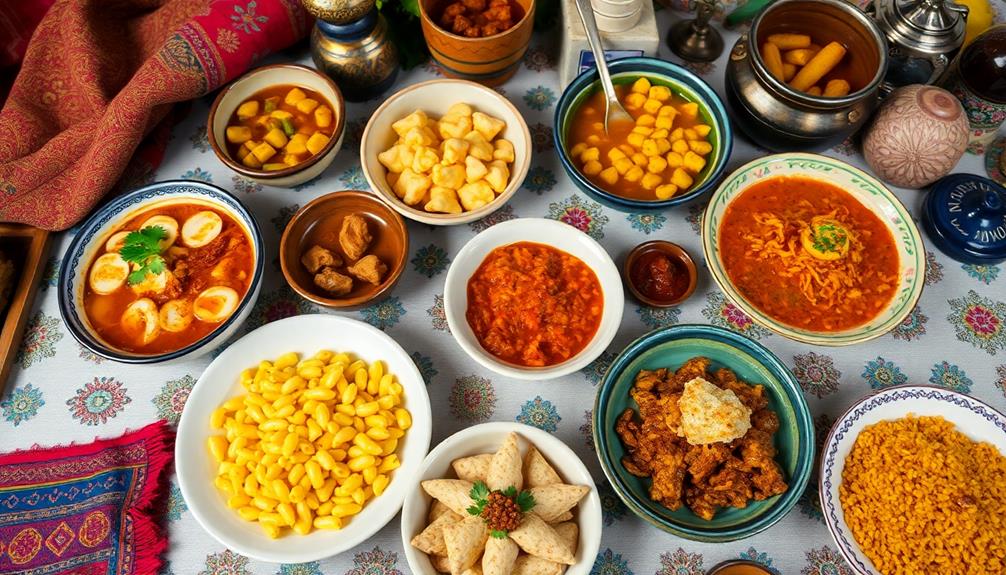
Across the globe, comfort food takes on diverse meanings, shaped by local ingredients, traditions, and cultural narratives. When you think of comfort foods, you might feel a deep emotional connection stemming from your culture. Each dish tells a story, whether it's a bowl of ramen in Japan, a warm chicken soup in the U.S., or a spicy curry in India.
For instance, in Mexico, dishes like Chilaquiles evoke feelings of nostalgia and warmth, showcasing the importance of using leftover tortillas. These foods not only satisfy hunger but also evoke cherished memories and reinforce your identity.
Consider these three comforting foods that resonate deeply within various cultures:
- Chili – A hearty dish in American kitchens that warms the soul during chilly nights.
- Sushi – In Japan, it's not just a meal; it's an art form that brings families together.
- Biryani – In India, this fragrant rice dish is often part of celebrations, uniting loved ones around the table.
As you explore these culinary delights, you'll notice how they can make you feel grounded and connected, reminding you of home, family, and shared experiences.
Comfort food, in its many forms, serves as a powerful means of cultural expression and emotional nourishment.
Nutritional Considerations
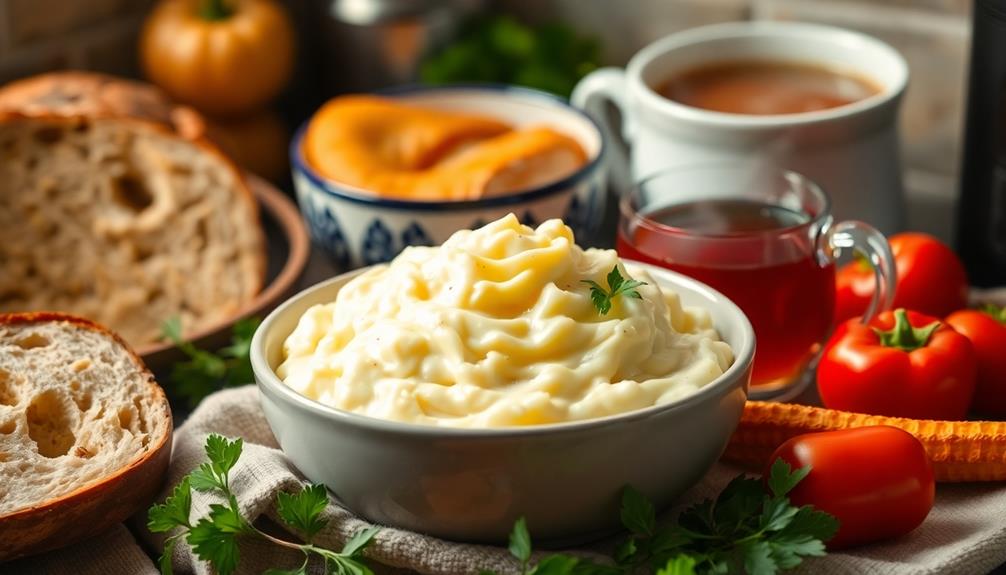
Nostalgic flavors often come with a hefty price tag regarding nutrition. Comfort foods are typically high in calories, fat, and sugar, which can trigger dopamine release and offer temporary emotional satisfaction. For instance, dishes like Dorayaki (Red Bean Pancake), although delicious, are often loaded with sugar and can contribute to excessive calorie intake.
However, indulging too much can lead to obesity and health issues. It's important to recognize how the nutritional content of these foods impacts your mood. High-carb and high-fat options might feel particularly comforting, as they stimulate serotonin production, but moderation is key.
While enjoying comfort foods can enhance your emotional well-being, relying on them excessively can create unhealthy eating patterns and promote emotional eating habits. You can make healthier versions of your favorite comfort foods by modifying recipes to include whole grains, reducing sugar, and adding fruits and vegetables.
This way, you can maintain that sense of satisfaction while boosting the nutritional value. Being aware of your emotional triggers for craving comfort foods can also help you develop healthier coping strategies.
Emotional Connections

Many people find that comfort foods create strong emotional connections, often linked to cherished memories and personal experiences. For instance, a warm bowl of Agnolotti filled with nostalgic flavors can remind someone of family dinners in Northern Italy. These foods activate your brain's reward centers, leading to feelings of pleasure and satisfaction.
When you indulge in these dishes, they can become a source of solace during stressful times, evoking nostalgia and uplifting your spirit.
Consider how comfort foods might resonate with you:
- Childhood Favorites: Remember the mac and cheese your mom used to make? That creamy texture and cheesy flavor can transport you back to carefree days.
- Family Traditions: Think about family gatherings where everyone enjoyed grandma's famous pot roast. Those shared meals reinforce bonds and create lasting memories.
- Cultural Dishes: Reflect on the comfort of a warm bowl of pho or a slice of homemade pie. These dishes often connect you to your roots and heritage.
The emotional connections to comfort foods are profound, rooted in the scents, tastes, and textures that evoke vivid memories. They not only nourish your body but also feed your soul, reminding you of moments that bring you joy and connection.
Sensory Appeal

Often, the sensory appeal of comfort food draws you in with its rich flavors and indulgent textures. Think of creamy mac and cheese or crispy fried chicken; these dishes not only satisfy your hunger but also evoke pleasure with every bite. The combination of textures, like the contrast between a crispy exterior and a soft interior, makes each mouthful a delightful experience.
| Texture | Description |
|---|---|
| Creamy | Smooth and rich, like mac and cheese |
| Crispy | Crunchy outside, tender inside, like fried chicken |
| Warm | Comforting heat, found in soups and stews |
Moreover, comfort foods often have taste profiles high in sugars, fats, and salts, activating pleasure receptors in your brain and triggering feelings of happiness. The inviting aromas of these dishes can transport you back to cherished memories, enhancing their nostalgic value. Warm meals, such as soups and stews, not only nourish your body but also provide a sense of care and nurturing, making them especially appealing during stressful times. Embracing the sensory appeal of comfort foods connects you to deeper emotional experiences.
Personal Influences

Personal influences play a significant role in shaping your comfort food preferences, deeply intertwined with early life experiences and cherished memories. These preferences often stem from the nostalgic moments spent with family, where certain dishes evoke a sense of warmth and security.
When you think of comfort foods, you likely recall:
- The smell of homemade cookies baking on a rainy day.
- Family gatherings centered around a beloved recipe passed down through generations, perhaps a dish like Khao Niao Sangkhaya that combines sticky rice and creamy custard.
- Holiday feasts that brought everyone together, celebrating tradition and love.
These memories create emotional connections that reinforce your cravings for specific dishes, making them more than just food. They become a source of solace during stressful times, allowing you to escape into a world of familiarity and comfort.
As you navigate life's ups and downs, these nostalgic foods remind you of simpler moments, providing emotional relief and a sense of belonging. Whether it's a bowl of mac and cheese or a slice of your grandmother's pie, your comfort foods offer more than sustenance; they carry the essence of your personal history, shaping your identity and emotional landscape.
Coping Mechanisms

When you're feeling down, emotional eating can trigger a rush of comfort that brings a sense of relief.
You might find yourself reaching for foods that remind you of better times, such as a warm bowl of satisfying creamed corn or a hearty slice of squash casserole, tapping into nostalgia and cherished memories.
Plus, the social connections tied to sharing these meals can deepen your sense of comfort, but it's important to recognize when this coping mechanism may become excessive.
Emotional Eating Triggers
Many people turn to comfort food as a way to cope with negative emotions, seeking solace in familiar flavors during tough times. Traditional Ethiopian dishes, such as Yekolo (Roasted Barley), can offer a unique, nutty flavor that might evoke feelings of warmth and nostalgia.
Emotional eating often serves as a temporary escape from stress and sadness. However, while comfort foods might provide momentary relief, they can also lead to unhealthy eating patterns and feelings of guilt afterward.
Recognizing your emotional eating triggers can empower you to develop healthier coping strategies. Consider these common triggers:
- Stress: When life gets overwhelming, those high-calorie comfort foods can seem like the only source of relief.
- Sadness: In moments of sadness, indulging in favorite snacks can appear comforting, but it often leads to regret.
- Loneliness: Eating can mask feelings of isolation, creating a cycle that reinforces emotional eating.
Nostalgia and Memory
Comfort food often connects us to cherished memories, evoking feelings of nostalgia that can be particularly soothing during stressful times. When you savor familiar scents and tastes from your childhood, you might find yourself transported back to moments filled with joy and security.
For instance, enjoying a bowl of hearty Krupnik (Barley Soup) can remind you of family gatherings and the warmth of shared meals. Research indicates that these positive, odor-evoked memories can greatly boost your mood and enhance feelings of happiness, reminding you of the comforting bonds formed around shared meals.
Specific foods tied to your upbringing can trigger a sense of safety, acting as a coping mechanism during difficult life events. Whether it's a beloved family recipe or a treat enjoyed at special occasions, eating comfort food can create a temporary escape from your current challenges.
This act not only satisfies your hunger but also reinforces a sense of belonging and nostalgia, helping you navigate feelings of stress or loneliness.
Studies show that the emotional satisfaction you derive from these nostalgic foods makes them especially appealing in tough times. By engaging with comfort food rooted in personal or familial memories, you tap into a powerful source of emotional resilience, allowing you to face life's ups and downs with a little more strength.
Social Connections Impact
Social connections play an essential role in how we seek comfort through food, especially during stressful times. When you're feeling overwhelmed, comfort foods often serve as a bridge to the warmth of family and friends. Those meals shared can evoke not just flavors but also feelings of belonging and safety.
Consider how comfort foods can impact your life:
- Strengthening Bonds: Sharing a favorite dish can deepen relationships, reminding you of the laughter and love shared at the dinner table.
- Easing Loneliness: During times of isolation, indulging in comfort foods can help you feel connected to cherished memories and people, alleviating some emotional distress.
- Creating Community: Whether it's pizza night with friends or a cozy family dinner, these shared experiences foster a sense of community that's crucial for emotional well-being.
Research shows that positive family relationships increase your likelihood of turning to comfort foods during tough times.
Social Context

When you think of comfort food, it often brings to mind family traditions and shared meals that create strong emotional bonds.
These dishes can serve as a bridge to nostalgia, reminding you of joyful gatherings and cherished memories.
In these moments, the social context of food not only satisfies your hunger but also strengthens your sense of belonging.
Family Traditions and Meals
Family traditions shape our comfort food preferences, often making specific dishes a central part of gatherings. These meals aren't just about nourishment; they're about connection. When you sit down with family, sharing beloved recipes, you're creating a sense of belonging that's hard to replicate.
Here are three ways family traditions enhance your experience with comfort foods:
- Generational Recipes: Each dish you share carries stories from your ancestors, linking past and present.
- Rituals of Care: Preparing and enjoying meals together builds emotional bonds, reinforcing the love and care within your family.
- Stress Relief: During tough times, reaching for those familiar comfort foods can provide immediate emotional support, reminding you of happier moments.
These comforting meals often evoke strong feelings tied to your cultural heritage and shared experiences. They serve as a reminder that you're part of something bigger, and each bite can transport you back to joyful family gatherings.
Embracing these family traditions not only nourishes your body but also strengthens the emotional ties that bind you to your loved ones.
Nostalgia and Emotional Bonds
Nostalgia plays a powerful role in shaping your connection to comfort foods, often intertwining with the emotional bonds formed during shared meals. When you savor a dish from your childhood, it can transport you back to family gatherings, reinforcing feelings of security and belonging. These shared experiences create a sense of community, deepening your emotional satisfaction.
| Nostalgia Trigger | Emotional Impact |
|---|---|
| Family recipes | Strengthens familial ties |
| Holiday meals | Evokes warmth and joy |
| Childhood snacks | Provides comfort and safety |
| Cultural dishes | Maintains cultural identity |
Research shows that familiar food scents can activate vivid emotional memories, especially during stressful times. When you face loneliness or stress, cravings for nostalgic comfort foods often spike, as you seek the emotional warmth these dishes provide. Your emotional ties to specific comfort foods are shaped by cultural backgrounds and generational recipes, underlining the significance of food in your life. Ultimately, these connections highlight how nostalgia and emotional bonds make comfort foods an essential part of your identity and well-being.
Frequently Asked Questions
What Is the Psychology of Food Comfort?
When you seek comfort in food, you're often chasing emotional satisfaction. Your choices might stem from nostalgia or cultural ties, but be mindful; what feels good now can lead to regret later. Balance is key.
What Is the Psychology Behind Comfort Eating?
Comfort eating often stems from emotional triggers, like stress or nostalgia. You seek familiar flavors to boost your mood and evoke positive memories, finding temporary relief while also risking unhealthy habits if relied upon too heavily.
What Does It Mean When You Crave Comfort Food?
When you crave comfort food, it often signals emotional needs. You might be seeking familiarity or relief from stress. These cravings can evoke nostalgia, giving you a temporary escape and a sense of warmth and security.
What Is the Theory of Comfort Food?
The theory of comfort food suggests that certain dishes evoke emotional satisfaction and nostalgia. When you indulge in these foods, you often find temporary relief from stress, enhancing your mood and providing a sense of familiarity. The concept of comfort food also ties into food plating psychology, which explores how the presentation of a dish can impact our perception of its taste and our overall dining experience. The visual appeal of comfort foods, such as a warm bowl of macaroni and cheese or a gooey slice of apple pie, can add to the feeling of comfort and contentment. Overall, the theory of comfort food and food plating psychology highlight the powerful connection between our emotions, memories, and the act of eating.
Conclusion
Just like a warm blanket on a chilly night, comfort food wraps you in a sense of safety and nostalgia. It whispers tales of home, evokes cherished memories, and offers a momentary escape from life's chaos. While it's easy to get lost in its embrace, remember that the true nourishment comes from balance. So, savor those familiar flavors, but also seek out new experiences. After all, every meal can be a journey, and every bite, a story waiting to unfold.
